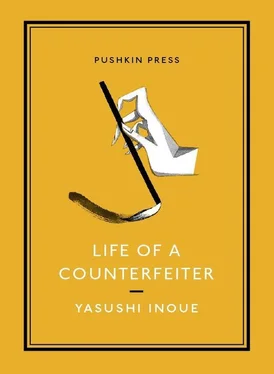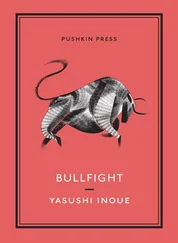“Old Hara’s fireworks… Well, he was just an amateur, of course, since he got into it as a hobby, but if you ask me he had a real talent for rapid fire. Naturally, I don’t know how people do it in the cities,” Tassan said. Then, pausing to chase off the children who had clustered around, he called out to the young men, “All right, let’s send up two or three, get ’em energized.”
This was the first time I had ever seen fireworks being launched. One of the young men tossed a small paper packet of gunpowder into one of the tubes, then put in the shell. He held a slow-burning fuse to the tip of a hardened chunk of gunpowder that he then tore off and chucked down into the tube. Immediately a burst of white smoke shot up into the still-sunlit sky, and there was a thunderous boom. I was stunned at how primitive the process was.
“I heard Mr. Hara was eager to make fireworks of a deep-violet color. Do you know anything about that?” I asked Tassan after the third firework, all sound and no fire, had gone up into the air.
“No, don’t know about that. Actually, now that you mention it maybe I did hear something along those lines, but my memory isn’t real clear,” he said. Then, after a moment, “The one thing I’ll never forget is the old man’s last display.”
When Tassan went back home the night Hara Hōsen sent up his last fireworks, he found a notice waiting for him saying he had been called up; from the time he enlisted until his return toward the end of the previous year, he had spent more than six years overseas. Presumably the special circumstances had imbued his memory of Hōsen’s fireworks that night with equally special emotions.
Tassan had been in north China less than a month when he got a letter from a friend informing him of Hara Hōsen’s death, mixed in among his first packet of letters from home, which reached him at his garrison in Fengtai.
“It’s funny, when I heard Old Hara had died, I felt this weird sense of pity for the man. I’d never seen him that way before, but it struck me that all along he had been dying. Looking back, I got the feeling things hadn’t been right with him when he did those fireworks.”
“Things hadn’t been right?”
“Sounds strange to put it like that, I know,” Tassan said. “It was just something about the way he looked that night — I can’t forget it, even now.”
Hōsen’s last fireworks display was part of a celebration of the two thousand six hundredth year of the imperial calendar or some such thing, and it was sponsored by a few neighboring villages, like the one that evening; it was held on the grounds of an elementary school in a village two stations down the line toward Yonago. Since no one else in the area knew anything about fireworks back then, Hōsen had agreed to handle the display; for two months prior to the event he worked to prepare the shells with young men from the village, and then he went to the site and launched them himself.
“We were just amateurs, of course, so there wasn’t much to the fireworks, but the rapid firing sure was remarkable.” I could tell Tassan was still proud of that display, so many years ago.
They had prepared sixty-four twelve-centimeter chrysanthemum shells for the event; Tassan was responsible for passing them to Hōsen, who tossed them into the tubes at a rate of about twenty a minute.
“When you’re doing rapid fire, you try to have the next one go up just as the first one is bursting overhead — space ’em out any more and it gets dull. Thing is, it’s pretty darn hard to go on chucking the shells in those tubes like that, keeping up the pace.”
And that, Tassan said, was just what Hōsen had done so splendidly, even with three fingers missing. The venue wasn’t a wide-open field like the one tonight: thousands of spectators were crammed into a plot next to the school, sandwiched between the town hall and the road, creating an atmosphere so lively you almost never saw anything like it in this region.
Hōsen, Tassan and three or four other young men were the only ones by the launching pad, which they set up in the playground, next to the horizontal bars. In a rapid-fire display you keep tossing in one shell after the next, so almost immediately the tubes burst into bright red flames, and you have to keep changing them all the time, but Hōsen managed that, too, moving so fast you could hardly believe he was as old as he was. But after repeating the same gesture so many times, and in the same hunched posture, it was impossible for him to straighten up immediately. And so, having launched the last of the sixty chrysanthemums just as smoothly as could be, still bent over, he asked Tassan—
“How was it? Was it beautiful?”
He had been too busy launching the fireworks to look up.
When Tassan told him they had been magnificent, he plopped down on the ground, his back still curved, and sat with his head down, saying nothing, panting loudly from an exertion that seemed to have sapped the sixty-seven-year-old man’s strength.
At last, without turning to face Tassan, he spoke. “I heard a lot of ooing and aahing.”
Tassan had been in such a dream-like state until a moment ago, as he was passing the shells along to Hōsen, that he hadn’t even noticed the cheers rising from the crowd; the sound came to him only now that Hōsen had mentioned it. Hōsen, too, must have been in that same hazy state, and heard the cheering for the first time as an echo, coming faintly to life inside him, once the display was over.
Tassan had told me how deeply Hōsen had impressed him that night; hearing the story, I found myself picturing the old man then, and the vision touched a chord in me, too. I took out my cigarettes and held them out to Tassan. He thanked me, took one, and slipped it in its shirt pocket.
“No smoking here,” he said.
Stupid of me, I thought, and hurriedly put them away.
“Seven years now, isn’t it, since Hōsen died?” I asked.
“That’s right. I was thirty-four when I got called up, now I’m forty.” Tassan smiled in an offhand manner. “The old man, he—” he began, then stopped. Soon he remarked that the villagers should be turning up any time now. Turning toward the bridge, I saw that it was true: little by little, a crowd was gathering as people ambled in groups of three or five along the raised paths that cut across the fields, or made their way along the train tracks. Looking closer, I realized that they were moving very slowly, weighed down by mats of straw or rushes that they had brought to spread on the ground, and bundles of food and drink wrapped in furoshiki ; only the children were darting on ahead.
The old man, he … Tassan left the thought unfinished, and I said goodbye to him and made my way along the embankment that jutted up over the narrow river toward the bridge, to see for the first time in ages whoever had come from the village where my family had taken shelter. At some point the sun had begun dropping behind the squat hills that ended in red cliffs at the western edge of the plateau; arrows of red evening light flew across the even field ahead of me, almost perfectly level.
I had the feeling I knew what Tassan had been about to say, even without hearing it. Just as Hōsen’s widow and my wife had interpreted something inside him in the same way, and felt the same revulsion, Tassan and I — we two, at least — felt the same attraction when we thought of Hōsen on the night he launched his last fireworks, even if we couldn’t explain what it was that made us feel that way.
I mulled this over as I walked.
*
And with that, I have set down what I know of the counterfeiter Hara Hōsen. Nothing but fragmentary stories heard from others. And yet, somewhere along the way, as I strung these pieces together, I had come to hold in my mind an image of this counterfeiter’s sixty-seven-year life as a sort of flow — a dark and frigid stream. There was no rhyme or rhythm to that painful surging, the dark and turbid motion of some essence the man known as Hara Hōsen carried within him from the moment of his birth that rendered it impossible for him to live otherwise than he did. Painful, yes, but the pain was matched by the peculiar sadness of our karma, so that whenever I found myself reflecting upon the sorrows of human life I would remember that thin, swarthy man with his weak and gloomy air — this was how I imagined Hara Hōsen now — softly drawing his counterfeiter’s brush across a sheet of paper, hiding what he was doing from his wife, or slipping out so she wouldn’t find him twisting gunpowder up in pieces of paper and setting them on fire.
Читать дальше












